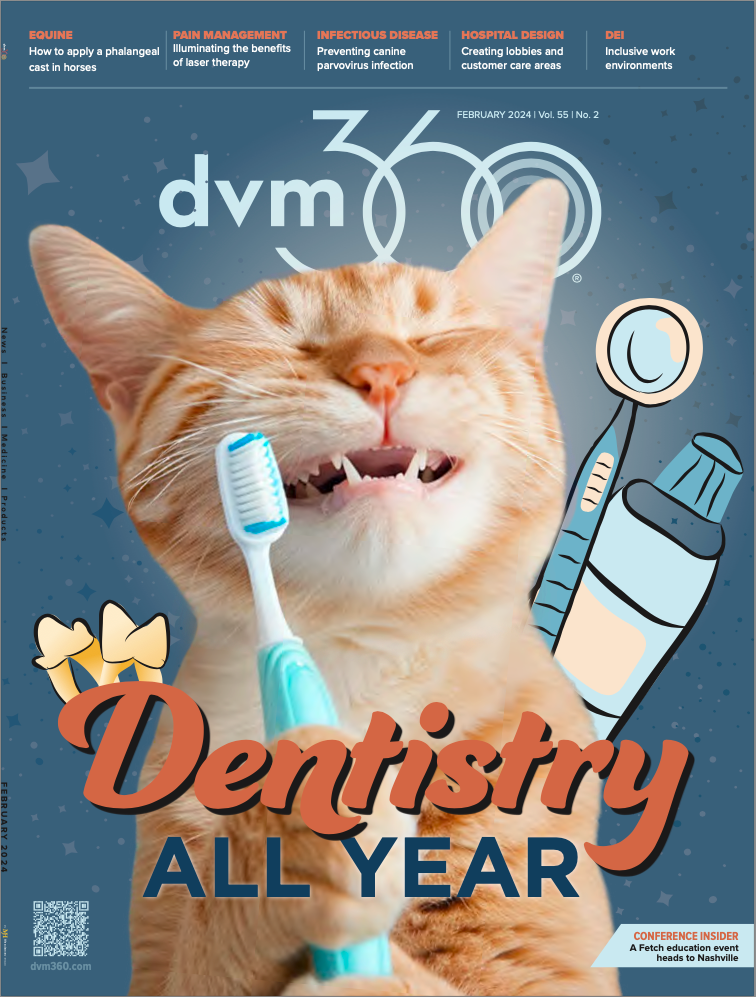Preventing canine parvovirus infection
The virus was one of the ‘hot topics’ in infectious diseases discussed during a session at the 2024 Veterinary Meeting & Expo
Illustration: Dr Microbe/Adobe Stock

There are an estimated 900 dogs diagnosed daily with canine parvovirus (CPV), and those that do not receive aggressive care in a timely manner face a mortality rate as high as 91%. Yet, investigators with Elanco Animal Health have found that many dog owners do not know what this virus is and about 20% are unaware of its existence at all.1
Highly contagious, this virus affects dogs by causing acute gastrointestinal disease. Most-often associated with puppies ages 6 to 20 weeks, CPV can also affect older dogs. The infection can damage the small intestine, cause myocarditis in puppies, and lead to death, according to Cornell University College of Veterinary Medicine in Ithaca, New York.2
At the 2024 Veterinary Meeting & Expo (VMX) in Orlando, Florida, Michael Lappin, DVM, PhD, DACVIM, director of the Center for Companion Animal Studies at Colorado State University in Fort Collins, and chair of the World Small Animal Veterinary Association One Health Committee, lectured on CPV, among other infectious diseases, to an audience of veterinarians and other industry professionals. He opened his talk, “Hot Topics in Canine Infectious Disease,” by addressing the optimal ways to prevent the transmission of infectious diseases in dogs by first discussing the notion of keeping pets indoors at home to avoid exposure.3 “We put ourselves at risk every time we leave the house,” he said. “But who enjoyed being the house for 15 months [during the COVID-19 pandemic]?”
Other methods of lowering the risk of Infectious disease transmission in dogs Lappin listed include controlling transport hosts and vectors, strategic deworming, controlling fleas and ticks, owning only 1 animal, and vaccination.3 “I’m a big pro-vaccinator because you never know when the next H3N2 dog is going to walk off the plane… and lead to outbreak,” he said.
In his talk—sponsored by Elanco Animal Health—Lappin also included discussion specific to vaccination for parvovirus.3 “Parvo vaccines work. If you live to be 26 weeks or so [with vaccination], you’re not going to die of parvo,” he told attendees.
A CPV vaccine is typically administered by veterinarians to puppies starting at age 6 weeks, as a combination inoculation with preventives for distemper, canine adenovirus and parainfluenza viruses. Administered every 3-4 weeks, the CPV vaccine is given to puppies until at least age 16 weeks with recommended boosters given a year later, then again in 3 years.
Dogs that do become infected with parvovirus may exhibit common symptoms that include lethargy, depression, inappetence, high fever, vomiting and diarrhea. Notably, CPV is one of only several causes of bloody diarrhea or vomiting, and testing by a veterinarian can diagnose an infection with this virus.2
Multiple treatment options are available to manage CPV, with the course of treatment determined by the severity of the disease. Dogs with parvovirus may need to undergo a hospital stay while receiving intravenous (IV) fluids and nutrients through a drip solution. Other treatment options include blood transfusion for increasing low blood cell counts, a course of antibiotics or monoclonal antibodies to fight the virus, and medications that can help manage nausea and diarrhea.1,2
References
- Elanco launches multi-year mission to save 1 million puppies from canine parvovirus. News release. Elanco Animal Health. January 17, 2023. Accessed January 18, 2023. https://www.prnewswire.com/news-releases/elanco-launches-multi-year-mission-to-save-1-million-puppies-from-canine-parvovirus-302036358.html
- Baker Institute for Animal Health. Canine parvovirus. Cornell University College of Veterinary Medicine. Accessed January 18, 2024. https://www.vet.cornell.edu/departments-centers-and-institutes/baker-institute/our-research/canine-parvovirus
- Lappin M. Hot topics in canine infectious disease. Presented at: Veterinary Meeting & Expo (VMX); Orlando, Florida; January 13-17, 2024.
